Ever felt unappreciated at work? Ever felt unsafe at work, or on your way there? Ever felt uncomfortable when a colleague or service user made a sexist/racist/homophobic comment? Ever wondered how come women, especially women of colour, always seem to end up in the most insecure positions…

Feminist? Join a union!
Ever felt unappreciated at work? Ever felt unsafe at work, or on your way there? Ever felt uncomfortable when a colleague or service user made a sexist/racist/homophobic comment? Ever wondered how come women, especially women of colour, always seem to end up in the most insecure positions, lowest on the pay scale, and still doing so much unpaid work just to keep things running? Ever felt alone in your struggle?
Feminist movements are built around care and struggle. Care for the collective, the community, and a never-ending struggle to improve our own and others’ lives. Feminist consciousness-raising groups, shelters, book circles, welfare services, legal reforms and campaigns to change attitudes – they have always been about caring for the community and for social justice for all. Trade unionism, the coming together of workers to fight for dignity and safety at work, shares this commitment to collective care.
A trade union is an organisation representing its members, organised based on workplace, sector or industry. It negotiates with employers on behalf of its members, winning equal pay and better conditions, and ensuring the safety of those at work. It also represents individual members who need help, campaigns on national and international scales for social justice, and informs – sadly not as much as many of us would like – parliamentary politics.
Right now Westminster is full of Tories working for the super-rich and the big bosses, cutting funding for services accessed by women (especially women of colour) and doing their best to silence trade unions. But don’t mourn, organise! Parliamentary politics is just one form of politics, as feminists know: politics also happens in the home, at work, in public spaces, in your trade union.
The trade union and labour movements have brought us so many things we now take for granted: weekends (!), holidays, break, sick pay, parental leave, protection against discrimination and harassment, secure contracts. All of these achievements are also feminist achievements. Huge trade unions wins have been led by women – see the 1969 Equal Pay Act and the Grunswick strike! Conditions at work are still inseparable from gendered, racialised, and other equality relations at work. Just to give two examples: women in precarious employment are more likely to experience sexual harassment at work, and in many sectors women and/or people of colour are more likely to be employed on insecure contracts. Addressing zero-hours contracts and other exploitative working conditions is a feminist issue.
When women first joined and set up trade unions in Britain, many faced sexism, and there are still such elements lingering in certain spaces, just as the racist discrimination within trade unions in the nineteenth and twentieth century has not entirely gone away, feminists have a crucial role in trade unions – and trade unions in the feminist movement. Despite the fact that women now make up more than half of trade union membership in Britain (compared to only ten percent in 1914!), and that since 2013 Frances O’Grady serves as the first female General Secretary of the British Trade Union Congress, only one in four working women are union members, with young people being underrepresented, and the Trades Union Congress (TUC) states that women, people of colour and young workers are underrepresented in union positions.
If you’ve been to a union meeting and left disheartened by the disproportionate speaking time taken up by male pale stale comrades (#notallmen), and walked out of there saying there’s no room for you there? (It happens in lefty spaces.) Don’t give up – bring together a band of sisters and feminist siblings, go there together and stay strong.
See which union is for you: https://www.tuc.org.uk/join-union
Lena Wånggren
Lena Wånggren is a teacher and researcher, currently working at the University of Edinburgh. She is also a trade union representative, and – obviously – a life-long feminist.




Leave a Comment